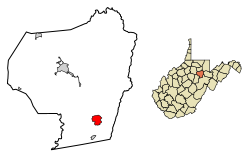2010 census
As of the census [10] of 2010, there were 1,921 people, 776 households, and 548 families living in the town. The population density was 932.5 inhabitants per square mile (360.0/km2). There were 878 housing units at an average density of 426.2 units per square mile (164.6 units/km2). The racial makeup of the town was 98.3% White, 0.3% African American, 0.1% Asian, 0.1% Pacific Islander, 0.5% from other races, and 0.8% from two or more races. Hispanic or Latino of any race were 1.0% of the population.
There were 776 households, of which 33.4% had children under the age of 18 living with them, 49.2% were married couples living together, 15.7% had a female householder with no husband present, 5.7% had a male householder with no wife present, and 29.4% were non-families. 23.6% of all households were made up of individuals, and 13.8% had someone living alone who was 65 years of age or older. The average household size was 2.48 and the average family size was 2.88.
The median age in the town was 40.9 years. 23.8% of residents were under the age of 18; 6.5% were between the ages of 18 and 24; 24.5% were from 25 to 44; 27% were from 45 to 64; and 18% were 65 years of age or older. The gender makeup of the town was 47.6% male and 52.4% female.
2000 census
As of the census [5] of 2000, there were 1,788 people, 713 households, and 518 families living in the town. The population density was 870.2 inhabitants per square mile (336.0 inhabitants/km2). There were 790 housing units at an average density of 384.5 units per square mile (148.5 units/km2). The racial makeup of the town was 98.66% White, 0.06% African American, 0.17% Native American, 0.06% Asian, 0.06% Pacific Islander, and 1.01% from two or more races. Hispanic or Latino of any race were 0.67% of the population.
There were 713 households, out of which 33.7% had children under the age of 18 living with them, 54.1% were married couples living together, 14.7% had a female householder with no husband present, and 27.3% were non-families. 23.8% of all households were made up of individuals, and 11.5% had someone living alone who was 65 years of age or older. The average household size was 2.51 and the average family size was 2.95.
In the town, the population was spread out, with 26.3% under the age of 18, 7.7% from 18 to 24, 26.2% from 25 to 44, 24.0% from 45 to 64, and 15.8% who were 65 years of age or older. The median age was 38 years. For every 100 females, there were 97.4 males. For every 100 females age 18 and over, there were 89.2 males.
The median income for a household in the town was $22,154, and the median income for a family was $28,500. Males had a median income of $25,809 versus $15,050 for females. The per capita income for the town was $12,905. About 18.3% of families and 20.9% of the population were below the poverty line, including 29.9% of those under age 18 and 7.7% of those age 65 or over.


